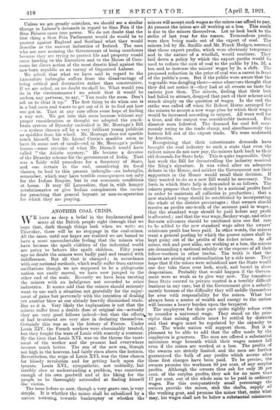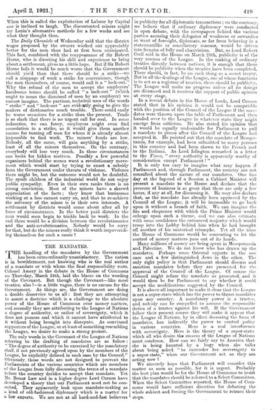ANOTHER COAL CRISIS. NAT E have so deep a belief in
the fundamental good sense of the British people right through that we hope that, dark though things look when we write on Thursday, there will be no stoppage in the coal-mines. All the same, until our hopes are realized we are bound to have a most uncomfortable feeling that the miners who . have become the spoilt children of the industrial world are going to behave like spoilt children. Fifty years ago no doubt the miners were badly paid and treated with indifference. But all that is changed ; in accordance with our national methods, which really suffer from extreme oscillations though we are supposed to be a phlegmatic nation not easily moved, we have now jumped to the other end of the scale. Recently we have been treating the miners with an indulgence not accorded to other industries. It seems odd that the miners should seriously want to use such a situation not gratefully for the enjoy- ment of gains but perversely with the intention of dealing yet another blow at our already heavily diminished trade. But so it is. Very likely the explanation is not that the miners suffer from a double dose of original sin—actually they are very good fellows indeed—but that the effect% of bad treatment are very slow in declaring themselves. Certainly this was so in the history of France. Under Louis XIV. the French workers were abominably treated, but they fought the wars of Louis with scarcely a murmur. By the time that Louis XVI. was on the throne the treat- ment of the worker and the peasant had everywhere become much better. The sun of the new era, though not high in the heavens, had fairly risen above the horizon. Nevertheless, the reign of Louis XVI. was the time chosen for bloody revolution and for getting back upon the tyrants. Louis XVI., sympathetic, not unkindly, but terribly slow at understanding a problem, was conscious enough of his own goodwill and of his liking for the people to be thoroughly astounded at finding himself the victim.
The issue before us now, though a very grave one, is very simple. It is whether the mines shall be subsidized by a nation tottering towards bankruptcy or whether the miners will accept such wages as the mines can afford to pay, At present the mines are all working at a loss. This result is due to the miners themselves. Let us look back to the strike of last year for the reason. Tremendous profits were then being made out of the export of coal. The miners, led by Mr. Smillie and Mr. Frank Hodges, assumed that those export profits, which were obviously temporary and in the nature of a windfall, would continue. They laid down a policy by which the export profits would be used to reduce the cost of coal to the public by 14s. 2d. a ton and to increase the miners' wages by 2s. a shift. The proposed reduction in the price of coal was a carrot in front of the public's nose. But if the public were aware that the vegetable was dangling there—some observers thought that they did not notice it—they had at all events no taste for carrots just then. The miners, finding that their bait had failed to attract, dropped that part of their scheme and struck simply on the question of wages. In the end the strike was called off when Sir Robert Horne arranged for the miners to accept a new wage plan by which their wages would be increased according to output. All went well for a time, and the output was considerably increased. But disaster soon followed. The demand for coal fell enor- mously owing to the trade slump, and simultaneously the bottom fell out of the export trade. We were undersold by America. Recognizing that their extortionate demands have brought the coal industry to such a state that even the richest mines do not now pay, the miners hark back to their old demands for State help. This is quite impossible. Only last week the Bill for decontrolling the industry received the King's signature. It was voted after an adequate debate in the House, and neither the Government nor their supporters in the House would recall their decision. If they wanted to do so a new Bill would be necessary. The form in which State help is demanded is as follows. The miners propose that there should be a national profits fund in order to maintain all collieries in production ; that a new standard wage should be established by incorporating the whole of the district percentages ; that owners should receive as profits one-tenth of the amount paid in wages ; that the standard wage should be paid before any profit is allocated ; and that the war wage, Sankey wage, and other flat-rate advances should be combined into one flat rate to be added to the new standard wage after the owners' minimum profit has been paid. In other words, the miners want a general pooling by which the poorer mines shall be kept going out of the profits of the richer mines. As all mines, rich and poor alike, are working at a loss, the miners are demanding a national subsidy at the expense of all their fellow-workers in other trades. The truth is that the miners are aiming at nationalization by a side issue. They hope that if the mines were subsidized now the State would one day take them over lock, stock, and barrel in sheet desperation. Probably that would happen if the Govern. ment were so weak as to give way now. The transition from State control to private control is a terribly difficult business in any case, but if the Government give a subsidy merely because of the difficulty they will saddle themselves for ever with responsibility for the mines. What has always been a source of wealth and energy to the nation will become a heavy burden upon the taxpayer. The employers for their part quite rightly refuse even to consider a universal wage. They stand on the prin- ciples that mining affairs must be settled by districts and that wages must be regulated by the capacity to pay. The whole nation will support them. But it is pleasant to be able to add that the offer made by the employers is generous. The men are offered a substantial minimum wage beneath which their wages cannot fall even if the mines are worked at a loss. The profits of the owners are strictly limited, and the men are further guaranteed the bulk of any profits which accrue after these first charges have been paid. To be precise, the owners promise the workmen 80 per cent. of any surplus profits. Although the owners thus ask for only 20 per cent. of the surplus profits, they ask for no more than 17 per cent. out of the whole sum to be paid in ordinary wages. For this comparatively small percentage the m owners provide the mines, • k the shafts, supply all the working gear, and promise the miner that, oome what may, his wages shall not be below a substantial minimum. When this is called the exploitation of Labour by Capital one is inclined to laugh. The discontented miners might try Lenin's alternative methods for a few weeks and see what they thought then.
The Daily Chronicle of Wednesday said that the district wages proposed by the owners worked out appreciably better for the men than had at first been anticipated. This fact, combined with the reappearance of Sir Robert Home, who is directing his skill and experience to bring about a settlement, gives us a little hope. But if Sir Robert Horne fails it would be much worse that the Government should yie!d than that there should be a strike—we call a stoppage of work a strike for convenience, though the men themselves, of course, would call it a " lock-out." Why the refusal of the men to accept the employers' handsome terms should be called " a lock-out " (which ought to mean the dismissal of men by an employer) we cannot imagine. The partisan, technical uses of the words " strike " and " lock-out " are evidently going to give the makers of dictionaries much trouble. There could easily be worse occasions for a strike than the present. Trade is so slack that there is no urgent call for coal. In some industries, we can fancy, employers might even find consolation in a strike, as it would give them another excuse for turning off men for whom it is already almost impossible to find work. The miners' funds are low. Nobody, all the same, will gain anything by a strike, least of all the miners themselves. On the contrary, everybody will lose very much. In these circumstances one looks for hidden motives. Possibly a few powerful organizers behind the scenes want a revolutionary move- ment which would start by trying to exact a subsidy from the Government under threats of violence. Violence there might be, but the outcome would not be doubtful. The spoilt children of the industrial world do not enjoy public sympathy. Even in their own ranks there is no strong conviction. Most of the miners have a shrewd appreciation of the facts ; they know that businesses working at a loss cannot carry on, and that to re-achieve the solvency of the mines is in their own interests. A settlement by districts would come about after all by force of circumstances. In the better paid districts the men would soon begin to trickle back to work. In the end there would be a division between the revolutionaries and the anti-revolutionaries. Nobody would be sorry for that, but do the miners really think it worth impoverish- ing themselves for such a cause ?



































 Previous page
Previous page